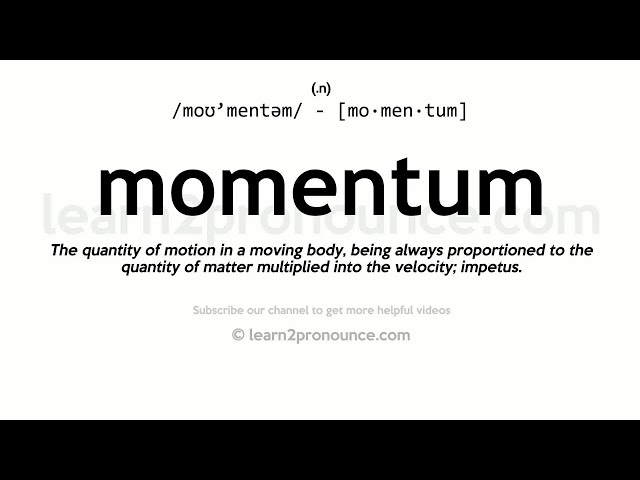Meaning For Momentum

In the realm of physics, momentum is the force that propels objects forward, setting them in motion and determining their trajectory. Beyond its scientific roots, momentum manifests in various facets of life, shaping endeavors, influencing outcomes, and defining success. This article delves into the multifaceted concept of momentum, exploring its significance across different domains and elucidating how individuals and organizations can harness its power to achieve their goals.
Understanding Momentum:
At its core, momentum encapsulates the idea of sustained progress or movement in a particular direction. In physics, it’s quantified as the product of an object’s mass and velocity, signifying the force with which it travels. Similarly, in life, momentum represents the cumulative effect of consistent actions and decisions driving progress forward.
In personal development, momentum embodies the continuous pursuit of growth and self-improvement. Whether it’s learning a new skill, adopting healthier habits, or pursuing ambitious goals, the momentum gained from small victories fuels further advancement. Each step taken builds upon the last, propelling individuals closer to their aspirations.
In business and economics, momentum refers to the trend or direction of market forces. Companies strive to maintain positive momentum by innovating, expanding, and adapting to market dynamics. A company with momentum experiences growth and profitability, buoyed by consumer demand, investor confidence, and operational efficiency.
Cultivating Momentum:
The cultivation of momentum requires a deliberate approach and sustained effort. Several factors contribute to its creation and sustenance:
- Clarity of Purpose: Momentum thrives in environments where individuals or organizations have a clear understanding of their objectives. Defined goals provide a roadmap for action, guiding efforts toward meaningful outcomes.
- Consistent Action: Momentum is not born from sporadic bursts of activity but from consistent, focused action. By establishing daily habits and routines aligned with their goals, individuals can maintain steady progress over time.
- Adaptive Resilience: While momentum implies forward motion, it’s essential to remain adaptable and resilient in the face of challenges. Setbacks and obstacles are inevitable, but those who can pivot, learn, and recalibrate their strategies can preserve momentum despite adversity.
- Celebrating Progress: Recognizing and celebrating small wins along the way reinforces momentum and boosts morale. Acknowledging achievements, no matter how modest, instills a sense of accomplishment and motivation to continue pushing forward.
- Iterative Improvement: Momentum is not static; it evolves through continuous iteration and refinement. By soliciting feedback, learning from experiences, and iterating on strategies, individuals and organizations can sustain momentum and stay ahead of the curve.
Impact of Momentum:
The effects of momentum permeate every aspect of life, shaping outcomes and influencing trajectories:
- Personal Growth: Individuals who harness momentum in their personal development journey experience exponential growth and fulfillment. By building momentum through consistent efforts, they expand their skills, broaden their horizons, and unlock their full potential.
- Business Success: In the corporate arena, momentum can be the difference between stagnation and success. Companies that capitalize on positive momentum enjoy increased market share, enhanced brand reputation, and sustainable profitability.
- Societal Change: Momentum is a catalyst for societal progress and transformation. Movements advocating for social justice, environmental conservation, or technological innovation gain momentum through collective action, driving meaningful change on a global scale.
- Creative Expression: In creative pursuits, momentum fuels artistic innovation and expression. Writers, artists, musicians, and inventors harness the momentum of inspiration to bring their visions to life, pushing boundaries and leaving a lasting impact on culture and society.
Challenges and Pitfalls:
While momentum holds tremendous potential, it’s not immune to pitfalls and challenges:
- Complacency: Success can breed complacency, leading individuals or organizations to become stagnant and lose momentum. Maintaining a hunger for growth and innovation is essential to avoid stagnation.
- Burnout: Relentless pursuit of momentum without adequate rest or balance can lead to burnout and exhaustion. It’s crucial to prioritize self-care and well-being to sustain momentum over the long term.
- Overextension: Pursuing too many goals or initiatives simultaneously can dilute focus and hinder momentum. Prioritizing objectives and allocating resources effectively is key to sustaining momentum and achieving meaningful progress.
Conclusion:
Momentum is more than just a scientific concept; it’s a driving force that propels individuals, organizations, and societies forward. By cultivating clarity of purpose, embracing consistent action, and remaining adaptable in the face of challenges, anyone can harness the power of momentum to achieve their goals and aspirations. Whether in personal growth, business endeavors, or societal change, momentum serves as a catalyst for progress, innovation, and transformation.
